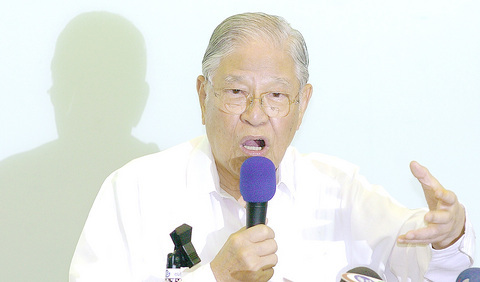Former president Lee Teng-hui (
"Any economic policy that abandons the consciousness of national identity is the wrong cure," Lee said yesterday in a lecture at the Lee Teng-hui School, a political academy he founded three years ago. "I never held a conference that catered so strongly to business interests in the 12 years that I was president."
The two-day Cabinet-sponsored conference failed to reach conclusions about cross-strait economic relations.

PHOTO: LIU HSIN-DE, TAIPEI TIMES
However, several issues including pushing for further direct cross-strait air transport links, lifting the ban on Taiwanese banks setting up subsidiaries in China, expediting the implementation of regular cross-strait air and sea cargo links and asking the Chinese government to recognize Taiwanese professional licenses, were listed as "other opinions."
"Other opinions" are intended to serve as advice for the government, but they have no binding effect on the Cabinet.
Upset by the Cabinet's tilt toward further easing restrictions on investment on China, Lee said the conference should discuss the country's overall direction, rather than pushing issues that failed to achieve consensus.
"Issues such as national security and sovereignty are the main concerns [that should guide] cross-strait economic policies. Promoting opinions that are not based on consensus is dangerous," he said.
Lee criticized President Chen Shui-bian (陳水扁), saying Chen had made Taiwan's economic performance lag behind the three other "Asian dragons" -- Hong Kong, Singapore and South Korea -- with his "active opening, effective management" cross-strait policy.
"Chen did not stress the importance of `effective management' until recently, but it's too late ... He only talked about it, he didn't act," Lee said.
He said Taiwan should not be too economically dependent on China because "globalization doesn't equal Sinicization."
The government, Lee said, should not just take care of big business while ignoring the voice of small business and blue-collar workers. Financial ups and downs and the proposed hike of national health insurance premiums would not improve the economy but widen the gap between rich and poor, he said.
He reminded the government that it should help the country to find its future path prior to 2008, which he called a "crucial time for political transformation in Taiwan."
"If [the government] doesn't grasp the opportunity and help Taiwan find its own path, it's hard to say what will happen to Taiwan," Lee said.

The High Prosecutors’ Office yesterday withdrew an appeal against the acquittal of a former bank manager 22 years after his death, marking Taiwan’s first instance of prosecutors rendering posthumous justice to a wrongfully convicted defendant. Chu Ching-en (諸慶恩) — formerly a manager at the Taipei branch of BNP Paribas — was in 1999 accused by Weng Mao-chung (翁茂鍾), then-president of Chia Her Industrial Co, of forging a request for a fixed deposit of US$10 million by I-Hwa Industrial Co, a subsidiary of Chia Her, which was used as collateral. Chu was ruled not guilty in the first trial, but was found guilty

DEADLOCK: As the commission is unable to forum a quorum to review license renewal applications, the channel operators are not at fault and can air past their license date The National Communications Commission (NCC) yesterday said that the Public Television Service (PTS) and 36 other television and radio broadcasters could continue airing, despite the commission’s inability to meet a quorum to review their license renewal applications. The licenses of PTS and the other channels are set to expire between this month and June. The National Communications Commission Organization Act (國家通訊傳播委員會組織法) stipulates that the commission must meet the mandated quorum of four to hold a valid meeting. The seven-member commission currently has only three commissioners. “We have informed the channel operators of the progress we have made in reviewing their license renewal applications, and

‘DENIAL DEFENSE’: The US would increase its military presence with uncrewed ships, and submarines, while boosting defense in the Indo-Pacific, a Pete Hegseth memo said The US is reorienting its military strategy to focus primarily on deterring a potential Chinese invasion of Taiwan, a memo signed by US Secretary of Defense Pete Hegseth showed. The memo also called on Taiwan to increase its defense spending. The document, known as the “Interim National Defense Strategic Guidance,” was distributed this month and detailed the national defense plans of US President Donald Trump’s administration, an article in the Washington Post said on Saturday. It outlines how the US can prepare for a potential war with China and defend itself from threats in the “near abroad,” including Greenland and the Panama

Taiwan People’s Party (TPP) Chairman Huang Kuo-chang (黃國昌) yesterday appealed to the authorities to release former Taipei mayor Ko Wen-je (柯文哲) from pretrial detention amid conflicting reports about his health. The TPP at a news conference on Thursday said that Ko should be released to a hospital for treatment, adding that he has blood in his urine and had spells of pain and nausea followed by vomiting over the past three months. Hsieh Yen-yau (謝炎堯), a retired professor of internal medicine and Ko’s former teacher, said that Ko’s symptoms aligned with gallstones, kidney inflammation and potentially dangerous heart conditions. Ko, charged with